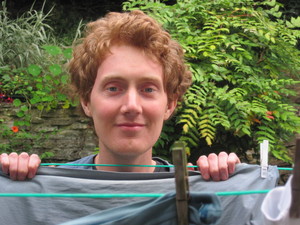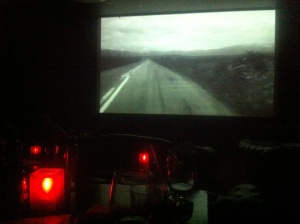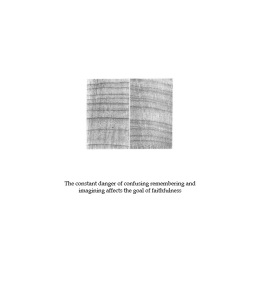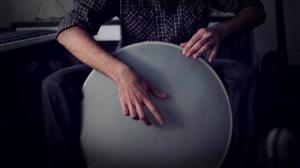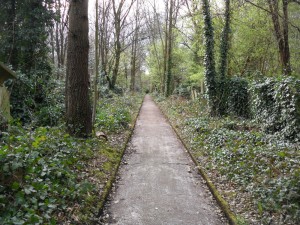Kate Potts

The Blown Definitions
(Radio Poem Script Extracts)
Paulo:
Where do you want to begin?
Lou:
How about Mesito? From the
beginning.
Paulo:
Mesito, huh? O malandro velho….
Claude Mesito, Mesito… You
recording this?
Claude Mesito was a fisherman
with tar-patched boots.
He whistled birdsong under his
breath.
Each Sunday in summer Mesito
slept on the front porch, flat out
on the stringy, fossilised
planks,
his jaw lolling open, chest
obscured by his monstrous cat, Lolo.
Mesito spoke very little
except to buy his weekly
newspaper and his groceries.
Once, when my father was much
younger,
for a dare, he sneaked into Mesito’s
one-room home.
Though dad only stood
beyond the beechwood door for
three, tight, breaths,
he claimed that Mesito slept in a
bath,
brewed strange, bitter herbal
tisanes in a gigantic gourd
and ate cat food for dinner.
Dad remembers Claude as
bloodshot, but strong-toothed.
He went out, oilskin buttoned to
his chin,
every day except his rest-day,
observing the sea as if it were
a giant cow he tended to.
At four am, when the island was
hush-hush and the sky
still licorice, he tumbled down
to the jetty and set out. His
catch was tuna, shrimp-fish,
monkfish, yellow crab.
He sold most to the restaurants.
He conversed very occasionally,
with Mala at the grocery store,
about the cricket – gobbets of
the commentary he’d picked up
on his giant, leather-jacketed
radio.
No one had known Mesito’s father
and they said his mother
was an outlander.
She’d appeared on the sands one
day, half-cut and sea-draggled,
regarding her own, far-distended
belly
as if astonished by the sudden
imposition. She offered it up
in her hard, brown hands.
Mesito grew to be an element of
weather. Hands in pockets,
stubby-limbed and sober he hung
–
like sea-mist – about the
corners of the island. No woman or man
thought to bother him. He was
content:
a steady, winter snail. Last
fall, we hadn’t seen him for at least a week.
My uncle Theodor found him
lying face down on his bunk – his
flesh already sunken
but so pickled with salt and fish
guts
there was no other scent. They
said it was a heart attack.
It was the grocer, Mala,
afterwards –
sweeping and airing the room to keep
Mesito’s spirit comfortable –
who found the notebooks
in the bread bin: lacy with age
and larvae, spiral bound,
the Silvine brand.
She sat cross-legged on the floor
and read each one, deciphering
the sooty, schoolboy text.
Here was the island in squared,
biro letters: all its crags and curiosities
encoded – halting.
Research Project
2010 – present
Supervisor: Professor Jo Shapcott
‘The ear is the poet’s perfect audience, his only true audience. And it is radio and only radio which can give him access to this perfect audience.’ (Archibald MacLeish)
‘[A Poetics is] a question of technology as well as
inspiration.’ (Jerome Rothenberg)
How does the dramatic radio poem (defined here as a radio poem for two or more voices of at least fifteen minutes in length) function in response to the mechanics of its own broadcast technology? How does it, as part of a ‘secondary orality,’ differ from dramatic poetry written for the page?
While a dramatic poem in text form is usually experienced internally by individual readers at different times, the dramatic radio poem is experienced as external, disembodied voices by diffuse but simultaneous listeners. This thesis examines the
relationship between the mechanics of the radio poem’s broadcast and reception and
its structure and content, through close analysis of broadcast recordings and through the construction of an original dramatic radio poem ‘The Blown Definitions.’ The themes, tropes and preoccupations of the dramatic radio poem are considered (such as focus on region and place, and preoccupation with internal, un-heard or ‘ghost’ voices) as well as the means through which these are articulated.
The dramatic radio poem foregrounds sound-sense, musicality, and the less mathematical and ‘rational’ aspects of language. The theories of Walter Ong (on orality and literacy), Suzanne Langer (on feeling and form) and Julia Kristeva (on poetic language), as well as contemporary theory in physiology and neuroscience, are employed in the analysis (and, by extension, creation) of dramatic radio poetry.
The thesis explores the interaction between poetic and more utilitarian
language modes, examining the functioning of ‘representational’ and ‘non-representational’ signs. How much of the poem’s meaning is specific to culture or locale? How much may be lost in cultural or linguistic translation? This work explores the possibilities and limits of human communication and the ways in which specific technologies (and the desires that drive them) shape and inform
our thinking.
Biography
Kate Potts is a poet, creative writing teacher, and PhD student. Her poetry pamphlet Whichever Music (tall-lighthouse, 2008) was a Poetry Book Society Choice and was shortlisted for a Michael Marks Award. Her first collection is Pure Hustle (Bloodaxe, 2011). Her work has featured in a variety of magazines and anthologies, most recently Poetry Review and Dear World & Everyone In It (Bloodaxe 2013). Kate teaches creative writing for Morley College and the Poetry School. She is currently a writer in residence at Kingston University and co-organiser of a series of site-specific poetry performance events, Somewhere in Particular.
www.katepotts.net
www.somewhereinparticular.org
skatepotts@yahoo.co.uk












